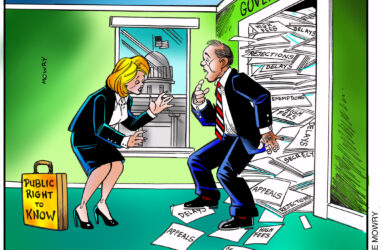In April 2018, this reporter filed a complaint with the Oregon Government Ethics Commission (OEC) alleging that I was unjustly booted from an executive session at a Creswell School Board (CSB) meeting.
To briefly recap, the incident occurred on March 14, 2018, when then-Chair Mike Anderson dismissed myself from attending an executive session during a school board meeting.
The two items listed on the agenda were, “to hear complaints or charges brought against a public officer, employee, staff member or individual agent who does not request an open hearing – pursuant to ORS 192.660(2)(b),” and “to consider information or records that are exempt by law from public inspection – pursuant to ORS 192.660(2)(f).”
The Public Meetings Law states that representatives of the news media are allowed to attend all executive sessions, except in these situations: for labor negotiations and to consider expulsion or matters pertaining to a student’s confidential medical records. Neither of those statutes were listed on the agenda that evening.
So, I consulted with Oregon Newspaper Publishers Association Lawyer Jack Orchard the day after the incident, who agreed that Public Meetings Law violations had occurred.
After attempting to work out the issue with district administration, on April 13 the complaint was filed with OEC.
In my complaint, I alleged that the board excluded the media from attending the executive session when the media had such a right, and that substantive meeting minutes were not taken that disclosed the nature of the topics discussed during the executive session.
OEC found cause to investigate on June 29 after considering the information developed in the preliminary review, stating, “There appears to be substantial objective basis to believe that violations of the executive session provisions of Oregon Public Meetings Law may have occurred on March 14, 2018 when an executive session was held by the (Creswell School) Board from which a member of the media was excluded and may have been held improperly.”
OEC stated the meeting minutes allegation is not within their jurisdiction, but the executive session violation was, and launched a 180-day investigation on the matter.
LEADING UP TO THE EXEC SESSION
According to the investigation findings, CSB was represented by Attorney Rebekah R. Jacobson, of Garrett Hemann Robertson, P.C., and gave OEC background information as to what led up to the executive session.
According to Jacobson, on Jan. 11, 2018, a formal complaint was filed with a CSD administrator, alleging that a student felt unsafe at school. The administrator reviewed the matter and provided a written decision.
“Following the decision, the student’s family filed a formal complaint with the superintendent, reiterating the family’s safety concerns; in addition, the family raised new allegations relating to the administrator’s handling of the initial complaint,” the report continued.
Superintendent Todd Hamilton reviewed the matter and issued a written decision that did not disturb the administrator’s findings. On Feb. 13, 2018, the student’s family responded by filing a formal complaint with the board, the next step in the complaint procedure.
Following the formal complaint, Jacobson said CSB contacted Oregon School Boards Association Attorney Spencer Lewis on how to lawfully handle the matter at a public meeting, and contended that “even if the law did not allow the exclusion of media representatives, the board in this case should not be subject to civil penalties for the alleged violation because it was acting on advice of counsel.”
Jacobson said CSB needed to consent to waive their attorney-client privilege, though the Commission did not necessarily agree and asked the attorney to ask the board to consider making the waiver during the November board meeting.
“Commission staff was told that the deadline for the ‘agenda approval’ had passed so that matter could not be considered at the board’s November meeting,” the report states.
OEC also asked the OSBA attorney to provide a general indication of whether he had provided advice that the board followed in this case, but did not respond to phone or email requests from Commission staff.
INVESTIGATION FINDINGS
During the investigation, OEC staff subpoenaed and obtained the records exempt from public inspection, including a complaint from a student’s guardian to the school principal; the principal’s written decision; the guardian’s appeal of the decision to the superintendent with and added complaint of the principal’s handling of the matter; the superintendent’s findings and conclusion affirming the principal’s decision; and the guardian’s appeal to CSB.
The materials included the name of some students and that student’s school support plan, according to the findings. The principal was informed of the discussion and given the opportunity to request an open hearing, which he denied.
It appears from the information available, according to OEC, that the board members discussed only this escalated complaint was permissible to discuss those topics under ORS. 192. 660 (2).
ON IDENTIFYING STATUTES
According to the report, then-Chair Anderson reported he identified the statutory authorizations for holding the executive session. “However, the audio recordings do not bear that out…it is difficult to tell from Mr. Anderson’s statements what the statutory basis was for holding the executive sesion,” the report states.
ORS. 192.660(4) requires governing bodies to allow representatives of the news media to attend executive session other than those held under ORS. 332.061. “The board did not identify ORS. 332.061 as a basis for holding an executive session either in the agenda or in the presiding officer’s announcements before convening the executive session,” the report states.
“It it not clear whether to comply with ORS. 192.660(4) the governing body must identify ORS.332.062 as the basis for holding the executive session,” but that identifying the statute “certainly would help media representatives understand the ground on which they are being excluded,” the report stated.
“But, because the executive session appears to have been authorized by ORS. 332.061 and ORS. 192.660(4) (and) does not clearly require that statute to be identified before excluding the media, there appears to be insufficient evidence to conclude that Mr. Anderson (and the board) violated the statute by excluding the media from attendance.”
The report went on to state that “although Mr. Anderson’s announcements were unclear, and standing alone, likely would not be sufficient to inform persons of the statutory basis for holding the executive session,” considered with the agenda information, the announcements arguably sufficed to meet the statutory requirement in ORS. 192.660(1).
According to the Commission, information is insufficient to indicate that the Creswell School Board failed to comply with the provisions at that executive session, and voted on Dec. 5 to dismiss the complaint.






